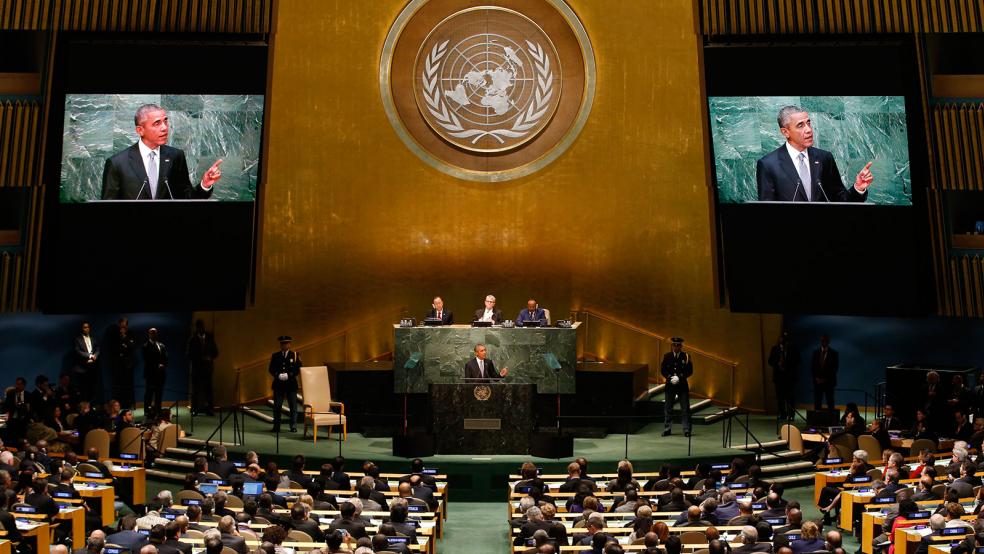In a forceful speech at the United Nations General Assembly on Monday morning, President Obama pointedly criticized Russia, and by implication Russian President Vladimir Putin, for its invasion of Ukraine’s Crimea, its support of Syrian dictator Bashar al-Assad, and the increasing suppression of dissent and the news media within its borders.
However, Obama went beyond the condemnation of specific Russian actions to challenge what he characterized as an anachronistic worldview in which Democracy is viewed with suspicion, national interests must be pursued by force, and the free flow of information is seen as dangerous.
Related: With Xi and Putin, Obama Sets the U.S. on a Course of Confusion
The explicit condemnation of Russia’s actions was surprising given that Putin himself was scheduled to speak before the same body later in the day and that the two men are scheduled to sit down for face-to-face talks later in the day.
The remarks may reflect an attempt by the Obama administration to find its footing on a world stage where unilateral Russian actions in recent weeks have shifted the ground significantly. The U.S. was plainly taken by surprise over the weekend when it was announced that Russia had signed an intelligence sharing agreement with Iraq, Iran, and Syria with the aim of coordinating the fight against the terror group ISIS in Syria and Iraq.
In the past month, Russia has established new and incontrovertible facts on the ground in the Middle East by injecting soldiers and heavy weapons into Syria, and closely aligning itself with Assad’s dictatorship.
For its part, the White House has long demanded that any solution to the ongoing civil war in Syria include the removal of Assad as president. On Monday, Obama said the dictator’s attacks on his own people, including the indiscriminate use of “barrel bombs” in civilian areas, are “an assault on all our humanity.” He also doubled down in his insistence that Assad must go.
Related: As Russian Weapons Stream in, How Far Will Putin Go in Syria?
Putin, however, feels differently. In an interview released over the weekend, he described the U.S. effort to aid rebels fighting Assad as against the law.
“In my opinion, provision of military support to illegal structures runs counter to the principles of modern international law and the United Nations Charter,” Putin said.
In a development that looks problematic for the Obama administration, at least one of the United States’ traditional allies now appears to agree with the Russian strongman. Australia, which has been participating in the U.S.-led air operation against ISIS, appears to have broken with the Obama administration on the Assad question.
Over the weekend, Australian foreign minister Julie Bishop met with Russian foreign minister Sergei Lavrov, and afterward told reporters that the Australian government was not making the removal of Assad a requirement of reaching a conclusion in Syria.
Real: Now We Know What Putin Is Up to in Syria
“There needs to be a political outcome in Damascus - all options should remain on the table,” she said.
Now, disagreement over a single foreign policy issue is hardly evidence of a breakdown in relations, but the news about Australia, coming as it does on the heels of the news that the Iraqi government, which is still largely propped up by the U.S., secretly negotiated an information sharing agreement with Russia, demonstrates that the ground is still moving under Obama’s feet in the Middle East, and that finding a balance might be more difficult than anyone realized.





